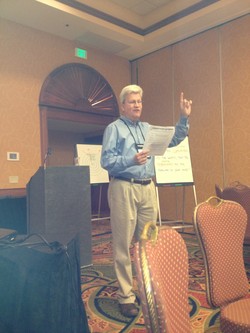The word “Christian” appears in the Bible just three times, while the word “disciple” appears 257 times.
Therein lies the key to effective ministry, the Rev. Glenn McDonald ― a former new church development pastor in suburban Indianapolis, told a session on disciple-making during the 2013 Evangelism and Church Growth conference here Sept. 17. “God has called us to go from maintenance to missional mode, and to surrender a focus on making mere decisions in order to major on making disciples,” he said.
Simply put, McDonald said, “Jesus defines the church’s mission for every generation: we are to be disciples who make disciples.”
Embarking on disciple-making requires becoming aware of one’s identity ― who we are or who we think we are, McDonald said ― and “then presenting ourselves to God for re-formation and transformation.”
To transform an individual, family, church or even nation requires knowing how human lives are structured, McDonald said. “Life is lived from the inside out,” he said, beginning with identity; values, which grow out of and reflect self-identity; then institutions, because people tend to form groups based on common identity or values; and finally behaviors, the outward manifestations of identity, values and institutions.
“What we do is always connected to who we are or who we think we are,” McDonald insisted.
True transformation, then, is a matter of changing identity, what McDonald called “the experience of learning from Jesus Christ, not from family or friends or culture.”
How does a church become a disciple-making community? McDonald outlined 12 “leadership commitments”:
- Prayer ― “the twin words from God are ‘don’t be afraid’ and ‘I am with you.’”
- Clarity of Vision ― a framed story that is consistent with the call of Jesus. “If there is a mist in the pulpit there will be a fog in the pew,” McDonald said.
- Committed stewards ― a core group in the congregation that owns keeping the church on track.
- Realistic thinking ― both culture and church will resist change.
- Priority of relationships ― “transformation happens much better through relationships rather than through programs.”
- Learning ― what works and what doesn’t work.
- Courage to confront our obstacles.
- Compelling stories ― power of testimony and vision-casting sermon illustrations
- Remember the poor ― “there are 2,000 verses in the Bible addressing the poor.”
- Continual prioritizing ― “resisting the temptation to be successful without being faithful,” what McDonald called “shadow mission.”
- Step-by-step ― begin with places where there’s already an openness to change.
- Perseverance ― “real change takes significant time.”

